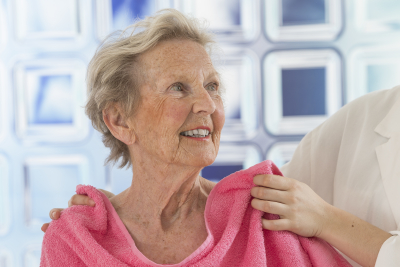
- Bathing
- Dressing
- Continence
- Toileting
- Transferring
- Meal Preparation
- Feeding/Eating
- Light Housekeeping
- Laundry
Compassionate Support You Can Count On
Personal Care Aides (PCAs) and Certified Nursing Aides (CNAs) play a vital role in supporting individuals who are aging, recovering from illness, or living with disabilities. These dedicated professionals assist clients with essential activities of daily living (ADLs), ensuring their comfort, safety, and dignity at home. The primary goal is to help clients maintain as much independence as possible while providing compassionate, hands-on care.
While PCAs typically focus on non-medical personal care tasks, CNAs often have more extensive medical training, allowing them to assist with basic clinical duties under the supervision of a registered nurse. Together, these caregivers are a lifeline for individuals who need daily support and emotional encouragement.
Why It Matters: Benefits of PCA and CNA Services
Hiring a Personal Care Aide and Certified Nursing Aide in Annandale, Virginia can significantly improve the well-being of clients and their families. Here are some key benefits of utilizing our service:
- Improved Comfort and Hygiene: Regular assistance with bathing, toileting, and dressing promotes physical comfort and reduces the risk of infections or skin issues.
- Safety and Fall Prevention: Transfers and mobility support help reduce the risk of falls, which are a leading cause of injury among seniors.
- Nutrition and Meal Support: Proper meal planning and feeding assistance ensure clients receive balanced nutrition tailored to their needs.
- Peace of Mind for Families: Knowing a loved one is in the care of trained professionals brings invaluable reassurance to family members.
- Promotes Routine and Stability: Establishing a consistent daily care schedule helps clients feel secure and supported in their own homes.
Frequently Asked Questions (FAQs)
What is the difference between a PCA and a CNA?
A PCA (Personal Care Aide) typically provides non-medical assistance like bathing and housekeeping, while a CNA (Certified Nursing Aide) can perform basic medical tasks under supervision, such as taking vital signs.
Who can benefit from PCA or CNA services?
Elderly individuals, people with disabilities, those recovering from surgery or illness, or anyone who needs assistance with daily living activities can benefit.
Are PCA and CNA services covered by insurance or Medicare?
Coverage varies depending on your plan. Some long-term care insurance policies and Medicaid programs may cover these services.
How do I know if my loved one needs a PCA or CNA?
If your loved one struggles with tasks like bathing, dressing, or meal preparation or has mobility limitations, it may be time to consider in-home care support.
Can I choose the same caregiver for every visit?
Yes, care providers often aim for consistency among caregivers to build trust and familiarity, especially for long-term care relationships.
Are caregivers trained to handle dementia or Alzheimer’s care?
Many PCAs and CNAs receive specialized training to support individuals with cognitive conditions, offering compassionate and structured care.
How do I prepare my home for PCA or CNA services?
Ensure that essential items are accessible, walkways are clear, and emergency contact information is readily available for a safe and efficient care environment.
Get the Care You Deserve—Right Where You Need It Most
Experience compassionate, professional care right in your home. Reach out to us today to start your personalized health journey with trusted experts by your side.



